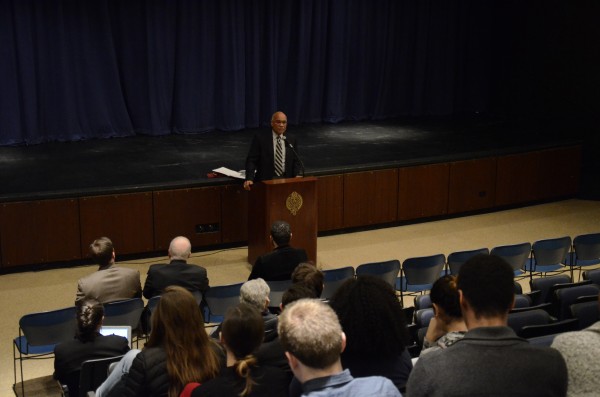Diversity Task Force Holds First Community Meeting
The diversity task force came to Pope Auditorium at 5p.m. March 7th for a meeting addressing current issues. (ANDRONIKA ZIMMERMAN/THE OBSERVER)
March 10, 2016
At the Diversity Task Force’s first of four community meetings, topics discussed included diversity, inclusion, trust, Robert Moses, attendance and affording pizzas.
The meeting, which took place on March 7 in the Pope Auditorium, was held to inform members of the Fordham Community about the Diversity Task Force and answer relevant questions. Rev. Joseph McShane, S.J., president of Fordham University, charged the Task Force with studying the climate of the University, reviewing and reporting on the programs already in place and developing recommendations for him and his cabinet on how to address issues of diversity and inclusion.
While issues of diversity and inclusion were addressed during the meeting, those present also discussed a perceived lack of trust between students and the administration, the ways in which the meeting was promoted and the location in which it was held.
Peter Vaughan, Ph.D., chair of the Diversity Task Force and emeritus dean of the Graduate School of Social Service, was receptive of the questions, feedback and criticisms that students and faculty members had, saying that “I think our biggest fear is that people don’t give us the suggestions and feedback that we need.”
Vaughan and other members of the Task Force also participated in the dialogues that attendees began and encouraged them to submit their feedback and criticisms so that they could be incorporated into the data the Task Force is compiling. This data will then be used for the report on diversity the Task Force is preparing for the University, according to Vaughan.
Despite the criticisms, attendees still acknowledge the meeting as a step in the right direction, such as a graduate student who said that many universities do not get as far as a community meeting in their efforts to address issues of diversity and inclusion.
Other issues that were discussed were eliminating hidden biases in curricula, presenting an unbiased history of Robert Moses and taking socio-economics, gender, sexuality and people with disabilities into account. The possibility of a committee being formed to monitor the measures following the completion of the Task Force’s report was also discussed.
Fuller coverage of this meeting and the community meeting on March 10 to follow.










